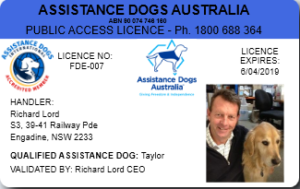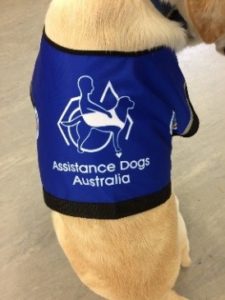Frequently Asked Questions
A not for profit organisation accredited with Assistance Dogs International (ADI) and Guide, Hearing and Assistance Dogs (GHAD).
- Post-traumatic stress disorder PTSD Assistance Dogs (Police, Military and Fire Fighters only, at this time)
- Physical disability Mobility Assistance Dogs
- Autism Autism Assistance Dogs
- Educational Support Educational Support Dogs
Assistance Dog is a generic term for a guide, hearing, or service dog specifically trained to perform identifiable physical tasks and behaviours to assist a person with a disability in order to aid in quality of life and/or independence. Assistance dogs are covered under many legislative access laws for public access rights when working with their handler who lives with a disability.
Assistance dogs are not to be confused with a therapy, emotional support or companion dog which are not required to undertake a Public Access Test (PAT)
All dogs can intrinsically provide emotional support to a human being. Assistance dogs are different from emotional support dogs in that they are specifically trained to perform identifiable tasks to increase independence and/or quality of life.
The Public Access Test (PAT) establishes a minimum standard for an assistance dog’s behaviour in a public area under state and federal law.
An example of a Public Access Test can be found here (Source www.qld.gov.au).
Please refer to this link for all information on relevant federal and state legislation.
- Medical Alert dogs for people living with diabetes or epilepsy
- Dogs specific to Anxiety and/or depression
- Guide/Hearing dogs
Assistance Dogs Australia is unable to accredit or register an emotional support dog as it falls outside our scope of services.
- Assistance Dogs Australia do not train/accredit/register dogs or puppies that are not part of our program.
- As an accredited organisation Assistance Dogs Australia only provide assistance dogs to people who have completed our application process in the services we offer.
For more information on programs not provided by Assistance Dogs Australia please see GHAD approved trainers and training institutions throughout Australia or Assistance Dogs International (ADI).
Assistance Dogs Australia’s accredited dog and handler teams will have:
– Completed a Public Access Test (PAT) to receive accreditation – this is an annual test.
– A navy blue jacket that is clearly marked to include:
– Assistance Dogs International logo
– Assistance Dogs Australia logo
– A handler’s licence including photo identification
– ID tag on their collar
Examples:


The Disability Discrimination Act 1992 (DDA) Section 9, sets out the legal definition of an assistance animal as a dog or other animal that is:
(a) Accredited under a State or Territory law to assist a person with a disability to alleviate the effects of disability; or
(b) Accredited by an animal training organisation prescribed in the regulations; or
(c) Trained to assist a person with a disability to alleviate the effect of the disability and meets standards of hygiene and behaviour that are appropriate for an animal in a public place.
(Source Human Rights Australia)
For businesses
Please click here to download an information sheet.
Assistance Dogs Australia also provide stickers which can be displayed in your establishment to show the public and recipients with Assistance Dogs they are welcome.
Please contact clientservices@assistancedogs.org.au if you would like our Business support pack.
There is no national register of Assistance Dogs in Australia at this time.
Queensland, Western Australia and South Australia have programs for accreditation and registration of Assistance Dogs. Please click on the following links for information.
QLD SA WA
At this time, New South Wales, Victoria, Australian Capital Territory, Northern Territory and Tasmania, do not have a formal system of accreditation or registration offered by local or state government.
For more information on laws and regulations concerning the public access rights of Assistance Dogs, you can check legislation in NSW and Victoria by clicking on the links below.
NSW VIC
Please contact your state or territory government if you live in Tasmania, Australian Capital Territory or Northern Territory.
Assistance Dogs are trained for two years to perform specific tasks to help their team-mate. For clients with physical disabilities, dogs can:
- Open and close doors, drawers, cupboards and fridge
- Retrieved dropped items
- Press the button at the traffic lights
- Take the washing out of the machine
- Remove items of clothing
- Pay the cashier at the shops
- Alert bark if their owner is in danger
Apart from the tangible day-to-day tasks an Assistance Dog can:
- Assist with the development and improvement of motor skills
- Provide greater freedom and independence
- Reduce the need for a carer
- Improve self-esteem and confidence
- Give love and companionship
Assistance Dogs Australia provides Assistance Dogs and their recipients with public access rights in accordance to the rules and regulations of Assistance Dogs International.
Assistance Dogs Australia trains and places with dogs with a wide range of people with different needs, which may include emotional or psychological support. Unfortunately, we do not train medical alert dogs.
Yes. Service Dogs who are placed with people that use wheelchairs have public access rights and are distinguishable by their blue jacket. They and their recipient undergo yearly public access testing and are issued with a licence. It is illegal to discriminate against or refuse entry to a person with an Assistance Dog and anyone who does so can be prosecuted. Any entry fee must not be charged to an animal that is an assistance animal. For more information on laws and regulations concerning the public access rights of Assistance Dogs please view the following references per state:
ACT NSW NT QLD SA TAS WA VIC
Other useful sites; The Queensland Guide, Hearing and Assistance Dogs Act 2009
Assistance dogs Australia provides different types of dogs to assist people with different needs:
- Service Dogs – Trained to assist their owner in ways specific to their needs, Assistance Dogs Australia provides Services Dogs to people with physical disabilities, as well as Autism Support Dogs, PTSD Support Dogs and Dementia Support Dogs. All Service Dogs have full public access right so they can accompany their owner anywhere in the community.
- Support Dogs – Trained to provide support to everyone at institutions such as schools,learning centres and care homes.
Learn more about the different services we provide.
Anyone with a disability. Assistance Dogs are placed with people who were born with developmental disabilities such as cerebral palsy or spina bifida, people who acquire debilitating illnesses later in life like multiple sclerosis and those who have been injured in tragic accidents and will never walk again. We also place dogs with children and adults with autism spectrum disorder, and sufferers of post-traumatic stress disorder (PTSD).
It is difficult to give a time frame on how long it will take to get one of our dogs. We take great pride in matching Assistance Dogs’ personalities and strengths to the needs of each recipient. For this reason, the first person on the waiting list may not be suitable for the next dog to graduate.
The first step is to fill in an application form which you can find on our website. Once submitted, a staff member will contact you within four weeks. You will then have a phone interview, a face-to-face interview before going on our waiting list. You will receive a final interview once a dog becomes available.
You can get involved by becoming a Puppy Educator, puppy carer or be part of our Bed & Breakfast program. We have many volunteering opportunities.
Unfortunately we are unable to provide training courses for people wishing to become Assistance Dogs trainers. For more information about this please visit The Delta Society.
We cannot provide work experience opportunities to anyone under the age of 18.
We make training a fun experience for our dogs. They enjoy classes, learning new skills and visiting different environments.
Assistance Dogs Australia’s trainers and volunteer puppy carers use positive reinforcement methods to elicit and motivate desired behaviours in our dogs. Desired behaviours are rewarded and undesired behaviours are redirected.
With Puppy Educators, Assistance Dogs learn basic obedience and experience appropriate socialisation activities in the community. Crate training is used to assist with toilet training and to provide puppies with a safe place to sleep. We socialise puppies with other animals and a variety of people so that they learn to be calm and confident in all situations.
When training at the Advanced Training, Assistance Dogs learn advanced tasks with qualified Assistance Dogs trainers such as pressing the button at the traffic lights. They also learn skills specifically tailored to the needs of their future recipient. Newly placed Assistance Dogs and their recipients undergo team training together before undertaking public access testing.
It costs in excess of $40,000 to train each Assistance Dog. This includes everything from purchasing a puppy, to food, vaccinations, training, and placement of dog to client. Assistance Dogs are provided free of charge to people in need. We do not receive government funding and therefore rely on the generosity of individuals, corporate and philanthropic organisations to provide our vital services to the community.
Touching is a distraction and can prevent Assistance Dogs from tending to their human partners. Be sensitive to the fact that Assistance Dogs are working and may be in the middle of a command or direction. Please always ask the handler before interacting with an Assistance Dog – whether they are in training or with their recipient. Interaction includes talking to or making sounds at the dog as well as touching it.
Assistance Dogs Australia sources puppies from reputable, registered breeders around Australia. We have also whelped litters of our own as part of our breeding program and are on the breeding registry.
We do not buy puppies from puppy farms or condone puppy farming.
With our wide range of services, it is very rare that we have unsuccessful dogs. In 2017, we had a 93% success rate with our Assistance Dogs. We are currently not taking any applicants or enquiries for our release dogs.
Usually a dog retires around the age of 10-11, meaning it has a working life of 8-9 years. Each case is looked at individually.
When they retire Assistance Dogs Australia ensures they find a loving ‘forever home’. Often this is within the client’s family or friends network.
